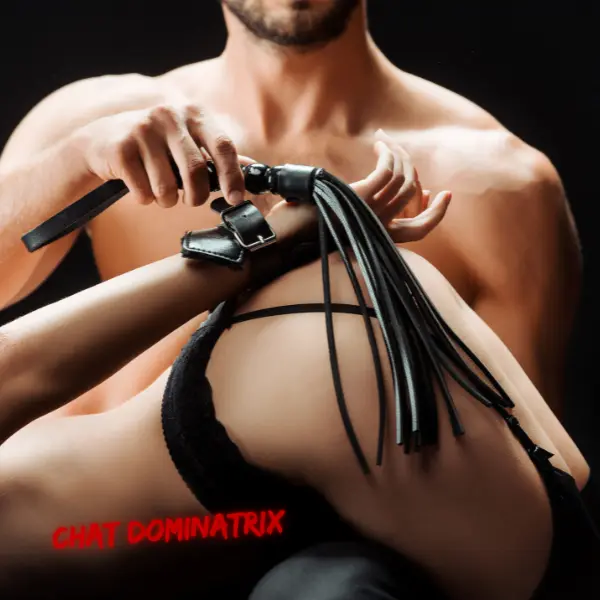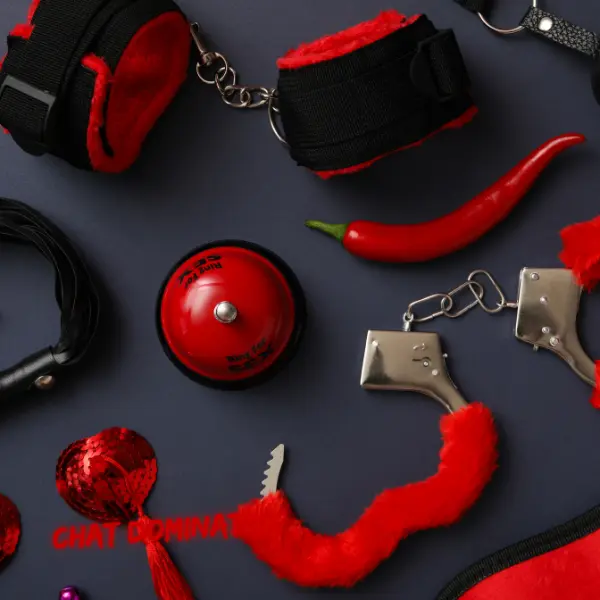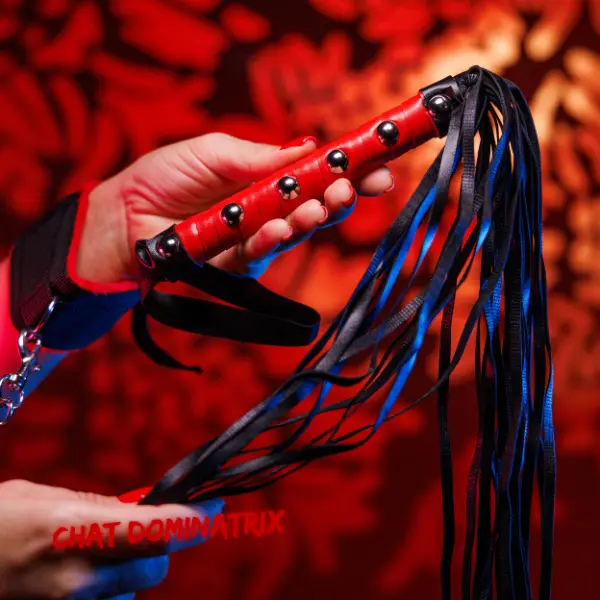Why Gear Matters in BDSM
In the realm of BDSM, the right tools can transport a scene from basic to unforgettable. A collar can turn a simple power exchange into a proud moment of ownership; a flogger might deliver not just physical sensations but also a visual flourish of tails dancing across skin. Whether you’re curious about your first pair of cuffs or dreaming of an elaborate dungeon setup, having a solid grasp on essential BDSM gear ensures you choose items that enhance trust, intimacy, and your unique brand of erotic exploration.
This article delves into the fundamentals of BDSM gear, from collars and restraints to impact tools and sensory toys, highlighting how to use each safely and thoughtfully. If you’re ready to build (or expand) your kinky toolbox, read on.
Disclaimer: This content is for consenting adults (18+). Always practice informed consent, follow local laws, and maintain ongoing communication to ensure every BDSM experience is both fulfilling and safe.
Table of Contents
1. Collars & Leashes
1.1 Symbolism & Power
A collar often symbolizes devotion, ownership, or a deep D/s (Dominance and submission) dynamic. Some wear it proudly in private scenes, while others choose discreet day collars for a subtle nod to their BDSM bond.
- Materials: Leather, silicone, neoprene, or metal chains. Each offers a distinct look and feel. Leather exudes classic charm; neoprene suits water play and easy cleaning.
1.2 Leash Play
Attaching a leash to a collar underscores a pet-play vibe or a more general power exchange. Always discuss whether pulling or leading will be part of your scene, some enjoy gentle tugging, others prefer purely symbolic use.
Safety Tip: Ensure the collar isn’t too tight. You should fit 1–2 fingers comfortably under it. Continuous check-ins prevent accidental choking or panic.
2. Cuffs & Restraints
2.1 Finding the Right Fit
Cuffs come in numerous materials, from metal handcuffs to padded leather or plush-lined Velcro cuffs. Think about:
- Comfort: If a sub will be restrained for extended periods, padded cuffs minimize skin irritation.
- Security: Metal cuffs look intense but can be harsh on wrists and require a trustworthy key system.
2.2 Rope Bondage
If you prefer rope, learn basic knots and safety checks e.g., two-finger rule for circulation. Use high-quality cotton or hemp rope for a pleasing balance of friction and ease of tying.
Safety Tip: Frequently ask about numbness or tingling in limbs. Loosen or remove restraints at the first sign of restricted circulation.
3. Impact Tools: Spankers, Floggers & Beyond
3.1 Paddles & Spankers
Paddles come in wood, leather, or silicone. A broad surface spreads the impact (often a “thuddy” sensation), while smaller surfaces focus it (a “stingy” effect). For novices, moderate-sized paddles with smooth edges are a good start.
3.2 Floggers
Floggers have multiple tails; materials range from suede (gentler, thuddy) to rubber (harsher, stingy).
- Technique: Practice a figure-eight motion or a gentle wrap to avoid hitting unintended spots.
- Aim: Stay on fleshy areas (buttocks, thighs). Avoid kidneys, spine, and joints.
3.3 Canes & Whips
For the more advanced, canes (rattan or acrylic) and bullwhips introduce intense sensations. They require precision; a mis-aim can cause serious bruising or nerve damage.
Safety Tip: Always start with lighter impact and build intensity gradually. Keep a first aid kit and knowledge of safe striking zones.
4. Sensory & Sensation Play
4.1 Blindfolds
Removing sight amplifies other senses, each stroke, whisper, or breath feels magnified.
- Choose: Padded blindfolds that block light thoroughly without pressing uncomfortably on eyes.
- Check: The sub’s comfort level, some with claustrophobia might prefer partial coverage or short intervals.
4.2 Feather Ticklers & Brushes
Ideal for sensory teasing, gliding a feather or soft brush along skin can be an exciting contrast after an impact session or while bound.
4.3 Clamps & Pinwheels
- Nipple Clamps: Offer adjustable pressure on sensitive areas. Avoid leaving them on too long (10–15 minutes recommended) to prevent tissue damage.
- Wartenberg Pinwheel: A spiked wheel rolled gently over skin for a tingling, prickly sensation.
5. Bondage Furniture & Advanced Gear
5.1 Spreader Bars
Keeps arms or legs apart, exposing the sub to heightened vulnerability. Always ensure the sub can stand or lie comfortably without strain.
5.2 Bondage Benches & Chairs
Benches support the sub’s torso at an angle, perfect for flogging or spanking. Chairs can lock ankles or wrists for a seated scene. These can be pricey, so consider your storage space and usage frequency.
5.3 Suspension Equipment
Suspension, hanging a sub partially or fully off the ground, requires specialized knowledge of rope tension, body mechanics, and rigging points. This advanced practice demands thorough training to avoid falls or nerve injuries.
6. Materials & Care
6.1 Leather
- Maintenance: Condition periodically with leather balm; store in a dry place.
- Cleaning: Wipe with a damp cloth, mild soap if needed. Avoid soaking in water or using harsh chemicals.
6.2 Metal
- Rust & Hygiene: Keep metal items dry, disinfect with alcohol or specialized solutions. For intimate metal toys (e.g., urethral sounds), strict sterilization is crucial.
6.3 Silicone & Rubber
- Easy Wash: Many silicone toys can be boiled or sanitized with toy cleaners.
- Check for Degradation: Over time, rubber can degrade. Inspect for cracks or sticky surfaces.
7. Beginner vs. Advanced Gear
7.1 Starter Kit
- Soft cuffs or Velcro restraints
- A simple leather paddle or small flogger
- A blindfold and a moderate collar
- Water-based lubricant (for any friction-based scenes)
- Clear communication & safe words
7.2 Building Up
- Harnesses, posture collars, or rope sets for more intricate bondage
- Heavier paddles, multiple floggers of varying tail materials
- Clamps, pinwheels, or electro-stimulation devices if you enjoy sharper sensations
7.3 High-End and Dungeon Equipment
- Custom bondage furniture, suspension frames
- Medical fetish kits (e.g., speculums, needles) for advanced edge play
- Unique or vintage whips/canes for the connoisseur
8. Negotiation & Scene Planning
No matter the gear:
- Communication: Discuss the desired intensity, any hard/soft limits, and signals for slowing or stopping.
- Consent Is Ongoing: A sub may initially consent to flogging but decide to back out if the intensity feels overwhelming.
- Scene Flow: Introduce gear gradually, switching from cuffs to a blindfold, then to an impact toy, ensures a sensual buildup rather than abrupt changes.
9. Aftercare & Storage
9.1 Physical Aftercare
- Assess Marks: Look for bruises or rope burns. Soothe with lotions or cold packs if necessary.
- Offer Warmth: Post-scene, a blanket or robe can help the sub readjust to normal temperature.
9.2 Emotional Comfort
- Scenes involving vulnerability (e.g., intense impact or humiliating positions) can stir powerful feelings. Gentle talk, affirmations, and the sub’s preferred form of closeness or space help them process.
9.3 Gear Maintenance
- Clean items promptly to avoid odor or bacterial buildup.
- Store them in cool, dry areas away from direct sunlight or humidity.
- Inspect regularly for wear, replace cracked leather, frayed rope, or chipped edges on paddles.
Conclusion
Building a BDSM gear collection is both an art and an adventure, choosing items that resonate with your fantasies, exploring their possibilities, and mastering safety techniques along the way. From the symbolic weight of collars to the thrilling impact of floggers and the mesmerizing potential of advanced bondage rigs, the right equipment can drastically enrich your scenes.
Yet, remember: each new piece brings its own learning curve, requiring open dialogue, consistent care, and unwavering respect for both the sub’s well-being and the Dominant’s responsibilities. By selecting quality gear, practicing mindful use, and engaging in thorough negotiation, you’ll forge a kinky toolbox that transforms ordinary nights into extraordinary expressions of BDSM passion.




